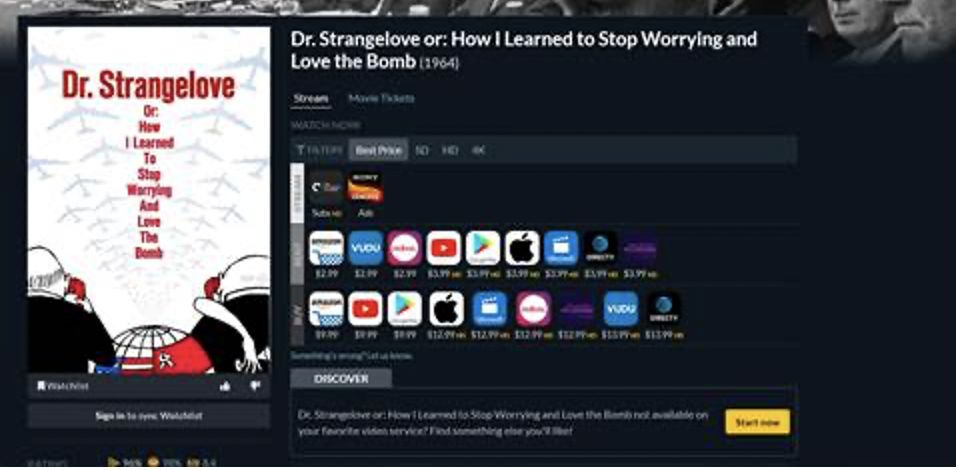Films Online
From: “Rosemary Arneson (rarneso3)” <rarneso3@umw.edu>
Date: Monday, March 16, 2020 at 9:15 AM
To: “All_TEACHING_FACULTY@umw.edu” <All_Teaching_Faculty@umw.edu>
Subject: Films online
Dear Colleagues,
My team and I are continuing to look into ways we can help you and your students access the films they need. We’ve already purchased a couple of films through Kanopy, and we’ll gladly keep doing so. Remember we also have access to Films on Demand (https://libguides.umw.edu/filmsondemand). Paul Boger wrote a guide for all our streaming services: https://libguides.umw.edu/kanopyguide. His guide includes a tab for open videos, where you may be able to find additional resources.
For feature films, the best option is to see if the film is available to stream on a commercial service. I use Just Watch (https://www.justwatch.com/) to search across multiple streaming sites. As you can see in the example below, Just Watch where you can stream, rent, and buy a film. I realize that some students may not want to pay even a nominal cost to rent a film, and we’re still investigating alternatives.

As I am sure you are aware, copyright restrictions on films are different from those for print. This statement is taken from the Public Statement of Library Copyright Specialists (https://tinyurl.com/tvnty3a) issued last Friday:
DMCA and Video
While fair use offers a clear path for most uses in rapidly shifting to remote teaching, some uses raise other concerns. In particular, copying a full-length movie or television episode from a DVD for use in teaching may require circumvention of technical protection measures, which is prohibited under the Digital Millennium Copyright Act (“DMCA”). Like fair use, the DMCA is designed with flexibility in mind—it empowers the Librarian of Congress to create exemptions allowing circumvention under certain circumstances. Unfortunately, the current exemptions extend only to copying “short portions” of motion pictures for use in certain types of teaching, not to copying entire works, even when doing so is clearly fair use. Courts disagree on whether circumvention violates the DMCA when the underlying use is non-infringing (for example, because of fair use) and on what constitutes circumvention. Individual institutions will need to make their own assessments of this issue in consultation with their legal counsel or administration.
When possible, we encourage using video through licensed services. From Netflix, Hulu, and Amazon Prime to PBS and cable channels, many films are readily available, either for free or after payment of a relatively low fee for access.
We’re continuing to look into options for films that aren’t available through one of our services or through a commercial service. Some of you have asked about specific titles, and I will get in touch with you as soon as I have an answer.
Thank you for your patience.
Rosemary
Rosemary H. Arneson
University Librarian
UMW Libraries
University of Mary Washington
540-654-1147